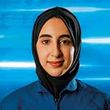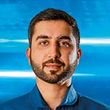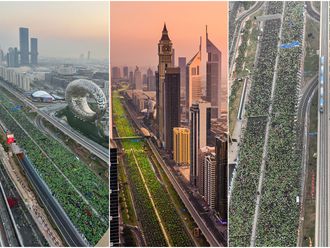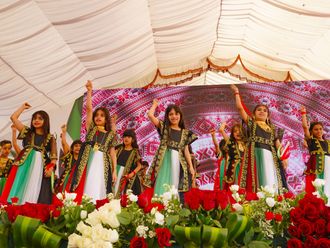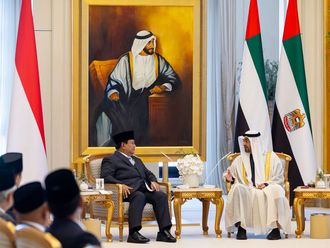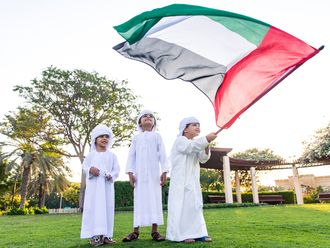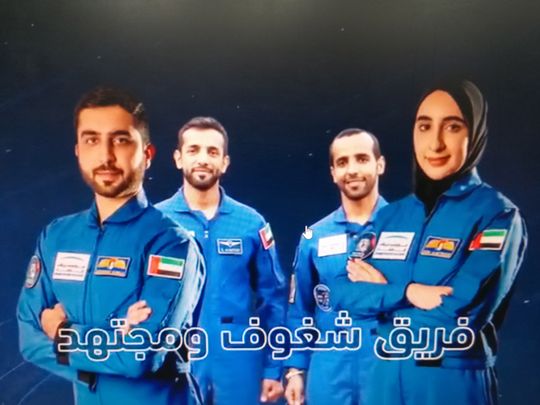
Dubai: The UAE on Saturday announced two new Emirati astronauts, bringing the total number to four now.
The announcement was tweeted by His Highness Shaikh Mohammed bin Rashid Al Maktoum, Vice-President and Prime Minister of the UAE and Ruler of Dubai.
"We announce the first Arab female astronaut, among two new astronauts, selected from over 4,000 candidates to be trained with NASA for future space exploration missions. Congratulations Noura Al Matrooshi and Mohammed Al Mulla," Sheikh Mohammed tweeted.
The two new astronauts join astronauts Hazzaa Al Mansoori and Sultan Al Neyadi to form a team of four under the UAE Astronaut Programme, serving the strategy of the Mohammed Bin Rashid Space Centre (MBRSC) base on achieving the vision of the wise leadership of the UAE and make it one of the leading nations in the field through the National Space Programme.
The announcement of the second batch of astronauts is a testimony of the progressive vision of the leadership towards building a knowledge-based economy in a smart community founded by the pillars of technological innovation and scientific research. This defines the journey towards UAE Centennial 2071.
The national space sector recorded investments of more than AED22 billion over the past few years with the selection of astronauts to empower national cadres being an integral project leading this sector. The UAE Astronaut Programme is one of the projects managed by the UAE’s National Space Programme and funded by the ICT (Information and Communications Technology) Fund of the Telecommunications Regulatory Authority (TRA), which aims to support research and development in the ICT sector in the UAE and prepare a team of Emiratis for scientific space missions.
The two astronauts from the second batch of the UAE Astronaut Programme will also join the '2021 Nasa Astronaut Candidate Class', as part of a joint strategic agreement between the UAE and the United States of America, to train them at Nasa’s Johnson Space Center. The two new astronauts will be trained in human spaceflight, research and space flight control, and will also be trained to carry out missions in low orbit, using the Human Exploration Research Analog, a unique three-story habitat designed to serve as an analog for isolation, confinement, and remote conditions in exploration scenarios.
Under the training programme, the astronauts will be trained to manage various missions on the International Space Station, including simulated spacewalks and long duration stay, along with training in major systems, robotics, extravehicular activity, T-38 jet courses, water and land survival, Russian language skills and theoretical training.
International standards of assessment 4,305 applicants had applied for the second batch of the UAE Astronaut Programme. The applicants underwent several phases of evaluation and qualification in accordance with international standards. In the first phase, the list was filtered down to 2099 applicants based on their age, educational background, and scientific research experience.
The applicants then underwent IQ, personality, and technical assessments, through which the best 1,000 candidates were selected. In phase two, after evaluating the top 1,000 candidates, the MBRSC evaluation committee selected 122 applicants, who were then interviewed virtually. Based on the interviews, the 122 candidates were further evaluated, bringing the shortlist down to 61 applicants.
For the third phase, the team at MBRSC conducted preliminary and advanced medical examinations on the shortlisted 61 candidates, which brought down the number of candidates to 30, who moved to the final phase. 14 candidates from the 30 were selected after passing the preliminary remote interviews of the final phase of evaluations. The shortlisted candidates comprised of nine males and five females, with a variety of scientific and academic backgrounds, including four working in the aviation sector, nine engineers, and a candidate specialising in metrology.
The final evaluation stage of the 14 candidates was conducted by a committee consisting of specialists from MBRSC, including Emirati astronauts Hazzaa Al Mansoori and Sultan Al Neyadi along with NASA astronauts Jessica Meir and Anne McClain, who narrowed it down to 4 candidates. The two candidates were then selected from the final four after undergoing rigorous tests for physical fitness, communication skills and teamwork.
Who are the new astronauts?
The announcement was followed by tweets about Al Matrooshi and Al Mulla by Mohammad Bin Rashid Space Centre (MBRSC). The duo will train with NASA, America’s space agency, for future space exploration missions.
MBRSC tweeted two short clips about the two new astronauts.
About Al Matrooshi
Al Matrooshi, born in 1993, holds a bachelor’s degree in mechanical engineering from United Arab Emirates University. She is an engineer at the National Petroleum Construction Company and was also the vice president of the Youth Council for three consecutive years at the company.
Al Matrooshi is a member of the American Society of Mechanical Engineers. She has a proven record of volunteer work and excellence in the scientific field and she ranked first in the UAE for the 2011 International Mathematical Olympiad.
Her passion in space began at a young age, as she enjoyed going to stargazing events. She lives by the motto of ‘Do what makes you happy.’
About Al Mulla
Al Mulla, born in 1988, is a commercial pilot license holder, besides a holder of flight instructor license from the Australian Civil Aviation Authority. He has a bachelor’s degree in law and economics. He obtained an Executive Master of Public Administration from the Mohammad Bin Rashid School of Government.
Al Mulla works as a pilot at Air Wing Centre, Dubai Police and is also the head of training department there. He has a 15-year-career experience and over 15,000 flight hours.
Al Mulla was the youngest pilot in Dubai Police at 19 years and youngest flight instructor in Dubai Police at 28 years. He has received the Bravery Medal from Shaikh Mohammad.
Al Mulla’s passion for space was born out of his love for aviation. He got further interested in the field after the announcement of the first batch of the UAE Astronaut Programme. His motto in life is: “The person who pursues their goal in life will achieve it, no matter how long it takes.”
How the second batch was selected
Out of 4,305 applicants, 2,099 passed the IQ, personality and technical assessments
122 then went through virtual interviews
61 went through preliminary and advanced medical examinations
30 went through preliminary rounds of interviews
14 passed a final round of interviews and evaluations
Four passed fitness, communications, and teamwork tests
The final two were selected
-- With inputs from Tawfiq Nasrallah, Senior News Editor


